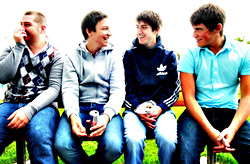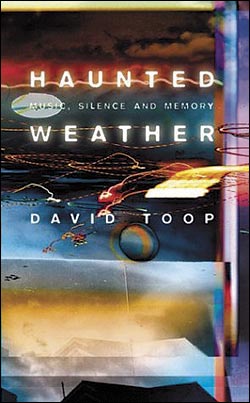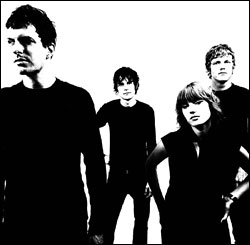It’s not like Alison Goldfrapp and Will Gregory ever had pointed ears or hooves. Nor has anyone ever spotted either of Goldfrapp’s members changing into a wolverine, flying fish, scarab, or pterodactylno one living, anyway. And those crackpot stories about A.G. having tiny horns on the handful of advance Felt Mountain posters that actually made it out to stores are nothing more than spurious inventions, disseminated by a tiny cabal of unhinged ex-record store workers with nothing better to do. (The lynxlike creature formed by elaborately intertwined strands of hair between her two heads is very nice, though.)
Nope, Goldfrapp are just like you and mea little more evolved than some of us, perhaps, but subject to the same array of foibles, appetites, whims, and vacillations. Hell, Gregory wears glasses (although they could be props). For all its mysterythe slightly extra-human lyrical cast, the verdant polychromatic arrangements, the dark and dreamy vibeFelt Mountain, the duo’s 2000 debut, is still nothing more than a record, full of stuff made up by humans for other humans to consume. Granted, A.G.’s High Priestess of Magnetic North act was mighty compelling, especially given the way she guided her pellucid, umpteen-octave soprano through the album’s enchanted forestbut it was still nothing more than an act. Can you imagine the letters she must have gotten, after all those straight-faced songs about shape-shifters and whatnot? Shit like: “Dear Alison/Like you/I am not like the others,” or, “My beautiful snow queen/You are the only person in the world/Who can make eugenics sound sexy.” Sheesh! It’s no wonder she switched her lyrical focus to earthier topics on this year’s Black Cherry (Mute).
THE MUSICAL CHANGES make perfect sense, too. Goldfrapp did the neo-noir thing so well on Felt Mountain that they pretty much played the genre. (And you were wondering why Portishead’s alleged new release keeps getting pushed back.) As Alison Goldfrapp explains the matter by phone from her home in London, though, the duo had any number of reasons for the switch from down-tempo cinematic orchestral pop to frisky ’80s-inflected synthcoreapart from her well-publicized rediscovery of old fave Prince. “A lot of it had to do with touring,” she says. “I love playing live, but I got sick of being stuck in the same persona, of having to exhibit this consistent reserve. I wanted to be looser, to have more fun with the process.”
Despite the duo’s refusal to color within previously drawn lines, Black Cherry offers plenty to soothe the savage old-school Goldfrapp fan. Both “Deep Honey” and the enchanting “Hairy Trees” draw heavily from the ethereal springs that fed Felt Mountain. And “Tiptoe,” the album’s most Prince-ly track, boasts a surprise chorus every bit as bathed in moonbeams as anything the two have recorded previously. The only difference is that the moonbeams are electronically generated.
“Will and I did nearly everything on Black Cherry ourselves,” A.G. notes, “which freed us up to experiment with different sounds, different tonal colors, whenever we wanted.” Given the results, that must have been quite often. It’s only Black Cherry‘s songwriting that occasionally harkens back to the decade before last; its synth and drum machinations ring resoundingly of absolute Nowsville. “Tiptoe” opens with a flourish cold as liquid nitrogen, only to finds its way into some of the most critterly sounding synth territory documented to date; at one point, the machines sound like a family of giant frogs popping out of some primordial ooze just to watch A.G. ascend into the ether on the aforementioned chorus.
On “Twist,” Goldfrapp up the biomorphic ante, populating the tune with a pack of electronically generated panthers, about half of whom sound like they’re either in heat or on the verge of attacking whatever it is panthers attack. All the snark and snarl provides the perfect instrumental underpinning for A.G.’s own double-edged assault. Her vocals are startlingly uninhibited; the ex-snow queen even delivers a few lascivious squeals and snarls of her own toward the song’s, erm, climax. And the woman who opened Felt Mountain’s “Paper Bag” by announcing, “No time to fuck,” seems to have done quite a bit of rearranging in her date book. “Twist” begins with: “Before you go and leave this town/I want to see you one more time/Put your dirty angel face/Between my legs and knicker lace,” eventually landing on the catchy “Fight me/Try me/Kiss me/Like you like me/Twist it ’round/Again and again” chorus.
IN YOUR FACE couplingin one form or anotherdominates the lyrical content of Black Cherry, to the extent that you find yourself wondering if maybe A.G. is looking not to become the new Prince but the old Madonna. In fact, the way Goldfrapp have reinvented themselves might smack seriously of Madonna’s penchant for doing the same, were it not for the fact that Goldfrapp haven’t really reinvented themselves. They’re still operating out of the same witchy wood that provided sustenance and shelter on Felt Mountainonly now some of the trees are covered with hair. And A.G. continues to weave tales of secret protocols and extrahuman liaisons; as “Strict Machine” indicates, she’s even into the mechano gambit. The only real difference between the albums is that most of Black Cherry‘s action is up close, physical, and steamy as the surface of Venus. Still, a change so dramatic is bound to jar, if not alienate, at least a few old Goldfrapp fans. But that’s all part of the initiation process. Admiring a high priestess from afar is one thing; dealing with her when she materializes in your living room looking to wrassle, as Alison Goldfrapp does on Black Cherry, is quite another.
Goldfrapp play Chop Suey at 9 p.m. Wed., Oct. 1. $13 adv.








